|
| |
Gaia I
|
|
While I earn my living from commissions and residencies, my personal work is a celebration of those who work for peace and justice. Since 2007, I have been creating iconic portraits of women, representatives of Gaia, the community of the living earth. These portraits celebrate the diversity of life through the efforts of women around the world who work to protect life.
The first twelve paintings in the Gaia Series, known as Gaia I, address issues of the predations of the global petroleum industry. In Gaia II, nine paintings address issues of food and water security. The women come from diverse places and backgrounds. Some are well known, some are unknown outside their neighborhood. Some are poor, some are highly educated professionals. They are united by their efforts to protect life and promote peace and justice.
The titles and accompanying poems explain some of the imagery within the paintings. The people whose faces you see have all been affected by the extraction and exploitation of petroleum in all its many forms. The paintings celebrate those in resistance to the plunder and profit of corporate petroleum in its many forms. They are both portraits of individual women and icons of worldwide resistance in many forms.
Gaia I paintings are acrylic on carpet felt (petroleum-based products),
and each measures 72" x 30". |
|
|
|
|
|
|
|
|
Raven
Long ago
Raven heard sounds in a clamshell on the beach
and pried it open
releasing the human beings into the world.
The price of their freedom is responsibility to care for the earth, their home.
Given access to what is their share to sustain life, they must not take what is not theirs.
Today the Shell is marked with red lines of blood.
A new and unholy cancer of profit
grows within.
We must crush the cancer in our imagination.
The people repeat the Ravenís cry: get the Shell out!
|
|
|
|
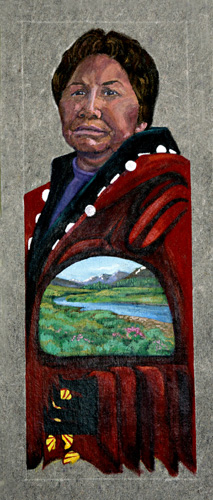
|
|
"Raven"
Tahltan,
British Columbia, Canada |
|
|
Ramona Quock and other Tahltan Elders lead First Nation peoples of Northern British Columbia in the struggle to prevent Royal Dutch Shell from destroying wilderness through the extraction and piping of natural gas to Alberta. Wyoming ranchers have already seen their land dismembered by natural gas production that is shipped to Alberta for use in extracting petroleum from oil sands.
|
|
|
Nine Nooses
People remember.
People remember
the nine activists hanged by the Nigerian government
with the collusion of Big Oil.
Sponsoring classy exhibits of Nigerian art
in London
does not absolve Big Oil of guilt.
Ogoni people remember
and continue the fight
to protect the Niger Delta and their livelihoods
from destruction by drilling and pollution.
They know that the promises of shared prosperity are hollow --
like a noose that has done its work.
They remember and speak naked truth to Power.
|
|

|
|
"Nine Nooses"
Niger Delta, Nigeria |
|
|
Ogoni People of the Niger Delta have used many forms of resistance to the dominance of Big Oil, that pollutes their land and waters, that has become a curse rather than a partner in economic and social well-being.
|
|
|
Rocks and Water
A road can be blocked by filling it with rocks.
A program can be stopped by refusing to participate.
People can refuse to give away their right to water
so that a faceless corporation may profit from their life need.
People can refuse to give away their right to traditional foods,
because those far away make expensive poisons of their plants.
The road to hell, paved with the grand intentions
of unlimited profits,
can be blocked by filling it with rocks.
|
|

|
|
"Rocks and Water"
Aymara, Bolivia |
|
|
The Aymara and other Indigenous Peoples of Bolivia blocked transport of Liquid Natural Gas leaving Bolivia for the benefit of transnational corporations by filling the TransAm highway with rock . The people of Cochabamba municipality successfully resisted the privatization of water through which the Bechtel Corporation would profit from human necessity. Electing its first Indigenous president, this Andean nation, has insisted on its right to traditional use of coca leaves in spite of US addiction to profitable street drugs and their companion prison system.
|
For all People who believe that earthís resources should be
equitably shared to support life. |
|
|
Wearing Red
Wearing red, the royal color of Thailand,
the people come together in faith
of a sustainable future
for their communal village lands and coastlines.
In faith that Buddhists and Muslims
have the same hands, the same hearts,
the same human needs,
in faith that decisions for growth should be made
by those in the community,
not in ocean distant boardrooms of
globalized markets.
Will the factories skipping through Malaysia
while labor there is cheap, keep faith for generations
with a sustained livelihood for those people or the people of Thailand?
If not, why destroy the Chana district,
appropriating common land, enying fisherman access to the water?
What divine decree says that Profit should be king?
|
|

|
|
"Wearing Red"
Chana, Thailand |
|
|
Villagers of the Chana District, Thailand, protest the Thai-Malaysia pipeline that will disembowel their farm and fishing communities so that natural gas can be piped to fuel Malaysian factories. They have resisted efforts to divide them along religious lines.
|
To all those work together, demanding their right
to maintain traditional livelihoods. |
|
|
Imaginary Lines
The corporate lawyers draw pictures
graphs and tables
of houses and schools that will be built with the peopleís share of the profits from oil. Imaginary lines, they float on paper,
but are never translated into a real houses of wood or stone
or real schools
with pencils and books.
The human rights lawyer
seeing real people,
with real needs now
demands that promises be honored,
now.
|
|

|
|
"Imaginary Lines"
Chad |
|
|
Chad Human Rights Lawyer Jacqueline Moudeina is President of Chadian Association for the Promotion and Defense of Human Rights which is advocating a more just national oil policy including a reasonable share (more than the promised 12%) of oil revenues, proper disposal of industrial wastes with public health in mind, adequate compensation for individual and communal land appropriated for the Chad -Cameroon pipeline, protection of national parks through which the pipeline will pass, and of forest Pygmies living there.
|
For all those who struggle to uphold the primacy of human rights,
including the rights to shelter, education, a respected livelihood
and a healthy environment. |
|
|
Sprout
The olive orchard can be walled off
broken apart
cut down.
Centuries old fabrics of peace,
of recognition of self in others,
can be shredded
torn apart
cut away by ideologies
of hatred and lies.
Still peace
will sprout
in the hearts of those who recognize
all people as one
as a community of life that must live together
or not at all.
|
|

|
|
"Sprout"
Israel |
|
|
Israeli Refuseniks speak out against the occupations of Gaza and the West Bank, against the invasions of Lebanon, against the continued regional terror and violence funded and fueled by the US attempt to control Mid East oil by any means necessary. Refusing the mandatory military service required by all young people, Alma Itshaky and other Refuseniks risk imprisonment and ostracism. They speak, as did the prophets of their tradition, against injustice to their fellow men.
|
For all those who are able to see past the rhetoric of race, religion,
and nationality and who therefore refuse to participate in the wars for
control of resources that benefit only a wealthy few. For all those who resist the colonization of our hearts and minds and choices and who refuse to participate in the injustice of domination. |
|
|
Rice
The farmer needed
only a small rectangle of land
to grow enough rice to feed her family.
The land was taken for military bases.
The farmer needed to sell
his excess at the market
to earn enough to provide for the familyís other needs.
Onto the market was dumped
the cheaper rice grown oceans away in the giant fields
of industrial agriculture.
The MARKET could not bear the price of the farmers rice.
The farmer swims across oceans,
climbs chain link fences,
endures tear gas and ridicule
to protest at the Conventions of International Trade.
The Farmer is arrested, granted his small rectangle in prison.
But he has planted seeds.
Some of the city people understanding the wisdom of the small farmer,
speak out on behalf of their comrades
in the prison of the MARKET EMPIRE.
|
|
|

|
|
"Rice"
Hong Kong and Korea |
|
|
In Korea, US military bases displace Korean farmers while other Korean families starve. Cheap US rice drives other farmers out of business. Korean farmers have been in the forefront of protests against Globalization and Free Trade Agreements. Locked out of trade agreements in Hong Kong, they swam the harbor so delegates could hear their protest. 14 were arrested and imprisoned. In solidarity, Hong Kong activists demanded their release.
|
For all those who protest NAFTA, CAFTA, and the WTO
wherever it is held.
|
|
|
|
The Well
When the well of earth goes dry
how will we live?
When all the farmers
who understand the sacred relationship of
humans, insects, animals, plants, and grains
are gone
who will grow the food?
Corporate giants
suck up the aquifers,
drying up the wells used for centuries.
With the water, they make their snake oil and slow poisons
then stomp on
looking for easy pickings.
When the well of compassion goes dry
how will we call ourselves human?
The corporate giants
have no compassion.
They are not swayed by human need.
They fear only the unrelenting stings
of the yellow and red fire ants
that protect the wells.
Over and over again, the fire ants
sting the giantsí feet
to drive them away. |
|
|

|
|
"The Well"
India |
|
|
|
Ever in need of more water to produce soft drinks, a slow poison of diabetes, obesity, and malnutrition, the Coca Cola Corporation is plundering water resources of India, drying up wells and driving farmers out of business. Indian activist, Ms. Mailamma , who died in January 2007, was founder of the anti-Coca Cola Struggle Committee and leader of the All India Womenís Democratic Association.
|
For all those who fight for food security, for small scale, diverse,
sustainable farming and animal husbandry practices, for sharing and preserving the watershed and aquifer. |
|
|
| Salud
The ship of public health
sails on a foundation
of adequate nutrition
clean air, water and shelter
and the self-respect of knowledge and ability
to care for oneís family.
Her sails are woven of
bio-diversity,
honored and sustained,
filled with the understanding
that the rights and needs of human
now
override the claim of The Market
that goodness and prosperity will trickle down
eventually.
The sailors of the ship
respond to need, not to profits,
work with education, sanitation, nutrition
and with medical treatments to assist
those the Market has failed. |
|

|
|
"Salud"
Cuba |
|
|
Because of the US trade embargo against Cuba, the island nation has not had access to petroleum based pesticides and fertilizers for agriculture. In response, a nationwide program of small scale intensive organic gardening provides food security for the population. Cuba has also been denied access to pharmaceuticals manufactured in the US or to medical care provided in the US system. In response, Cuba had developed one the best public health and medical education and treatment systems in the world. Cuba supplies medical teams to nations throughout the world where profit-based medical systems refuse to work.
|
For all those who find and create the alternatives that will nurture life. |
|
|
Mirror
The people hold up a mirror so the consumers of the north
can see the black plastic of their winter salads.
Acres of plastic line the rows of tomatoes grown in the desert of Baja,
grown with water pumped from the ground that can never be replaced.
The plastic holds the precious moisture
near the roots - just long enough for Christmas red.
There is no plastic husbandry after harvest.
The wind blows. Plastic julienne decorates the windbreaks
and will remain long after the dust bowl has claimed these industrial farms.
The people who invented corn,
and are now driven from their homes
by the US dumping of its engineered descendant.
The people, driven from their land to become
laborers in the plastic lined trenches of industrial agriculture,
hold up a mirror.
Can the people of the north see the their own faces
in the faces of these migrants?
Their faces are the same.
They both expect to be treated with respect and justice.
|
|
|
|
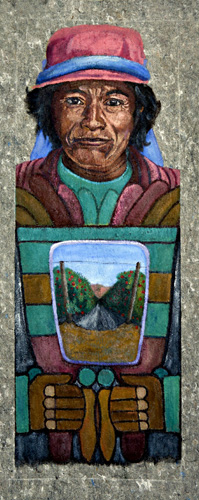
|
|
"Mirror"
Oaxaca, Mexico |
|
|
The Indigenous people of Oaxaca, center of one of the great Mesoamerican cultures, have watched their local economy fall to the ravages of free trade globalization. Workers and families migrate first to industrial farms in Baja and then to California. To protect worker rights in all three places and to protect and sustain their traditional cultures they have formed the Binational Organization of Indigenous Peoples. Maintaining democracy within the organization is a constant struggle, one in which women have been leaders.
|
For all those who resist the corporate enslavement of land and labor,
who believe that globalization must mean globalization of
environmental protection and workers rights, who believe that democracy must mean that all people participate in decision making
that affects our common future.
|
|
|
Blue Creek
Once the creek ran clear
reflecting the color of the sky.
Then came the factories,
the Profit Temples on the hill
springing up overnight,
then skipping town to
Asia as soon as
labor there was cheaper.
The Temples of Profit
drain their piss and shit into the water
turning the creek to brown sludge.
They belch their noxious fumes into the air
turning it to toxic fog.
When they leave,
they leave behind mountains of waste.
The people dream for their children
a swim
in the blue creek of their childhood.
For their children
they fight the priests of the Temple of Corporate Profits.
They demand that the priests clean up their shit --
like you would expect of anyone with a sense of human decency.
|
|
|

|
|
"Blue Creek"
Tijuana, Mexico |
|
|
Free trade agreements spurred the growth of maquiladoras along the Mexican US border. These come and go, chasing Profits when they find cheaper labor in Asia. Women of Tijuana barrios, led by Lourdes Lujan, organized the Chilpancingo Collective for Environmental justice, fighting both government and corporate lawyers, forced maquiladora owners to honor Mexican labor and environmental laws and to clean up toxic waste sites.
|
For all those who understand and demand that those who damage the earth must restore it to health.
|
|
|
|
Undazzled
From the window of the 16th century
Christian convent
One can see the Aztec
pyramid on top of the mountain.
National parks and monuments
both of them.
Bring on the tourists
cry the developers
Private Resorts
courses for golf
hotels and malls.
Such an opportunity
and Profit,
and employment, oh by the way?
Undazzled by disney dreams
of paradise fantasies
for the rich,
the people resist.
Let the golf stay
they reply,
on the hills and beaches of Scotland
where it belongs.
|
|
|

|
|
"Undazzled"
Tepoztlan, Mexico |
|
|
In Tepoztlan, Mexico, local people shut down the planned development of private resorts in national parks and on traditionally communal lands. World wide, golf courses, to maintain their unnatural green, consume massive amounts of water and are major sources of fertilizer and pesticide pollution. Eco-tourism is not without its share of guilt. While ecotourism helps supply revenues for parks and preservation of wildlife, native people and cultures are debased as they become underpaid servants and puppet dancers for photo opportunities.
|
To all those resisting the commodification of culture for the global tourist industry, and the appropriation of community land and water resources for resorts for a wealthy few. |
|
|
|
The Resistance is not to oil as a natural and useful substance that has been used for millennium. The Resistance is to the current global economic system, based on an ideology of the necessity of unlimited growth for the sake of profit. This ideology claims that we must use oil as fast as possible in order to make as much wealth as possible. This ideology denies the validity of any other values for decision making, values such as ethics, human rights, human and environmental health, community structure. This ideology claims that a Corporation is a Person, and has successfully manipulated our legal system to enforce the primacy of that fictional person's rights. The Corporation/Person has all the rights -- free speech, free association, free trade, freedom to travel.
However, the Corporation/Person has no responsibilities. It is not responsible for truth in advertising. It is not responsible to maintain livelihood for its employees, their families, or to sustain the future of the environment. It is not responsible to any cultural or religious values. It is not responsible to follow laws or regulations democratically decided by any people in any place.
The Corporation/Person is responsible only to make a Profit. The Corporation/Person thrives in the current global economic system, called Free Trade. Although the words are the same, they are antonyms to the free trade practiced by real persons who have responsibilities to one another, to their communities, and to a future for our children and all the other creatures on whose delicate and complex interactions life on earth depend.
|
|
|
|
|
|
Used Motor Oil Drawings
from the Series "Endangered Species"
|
|
|
|
|
|
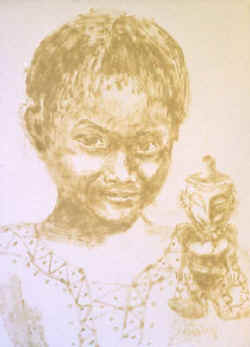
|
|
Colombia
28" x 22"
Used motor oil on paper |
|
|
|
|
|
Alaska
28" x 22"
Used motor oil on paper |
|
|
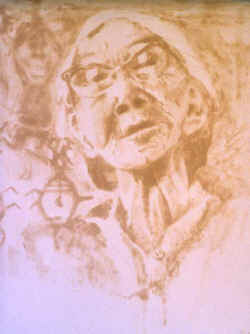
|
|
|
|
|
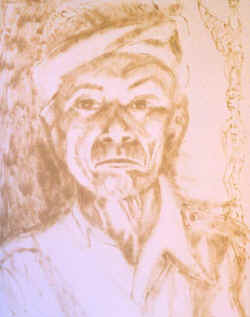
|
|
Indonesia
28" x 22"
Used motor oil on paper |
|
|
|
|
|
|
Tajikestan
28" x 22"
Used motor oil on paper |
|
|
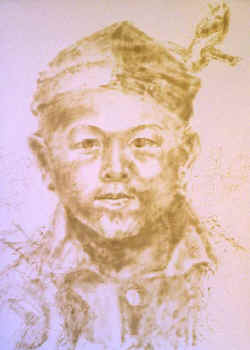
|
|
|
|
Click on images to see detail |
|
|
|
|
|
|
|
| |
|
|
|
|
|
|
|
|